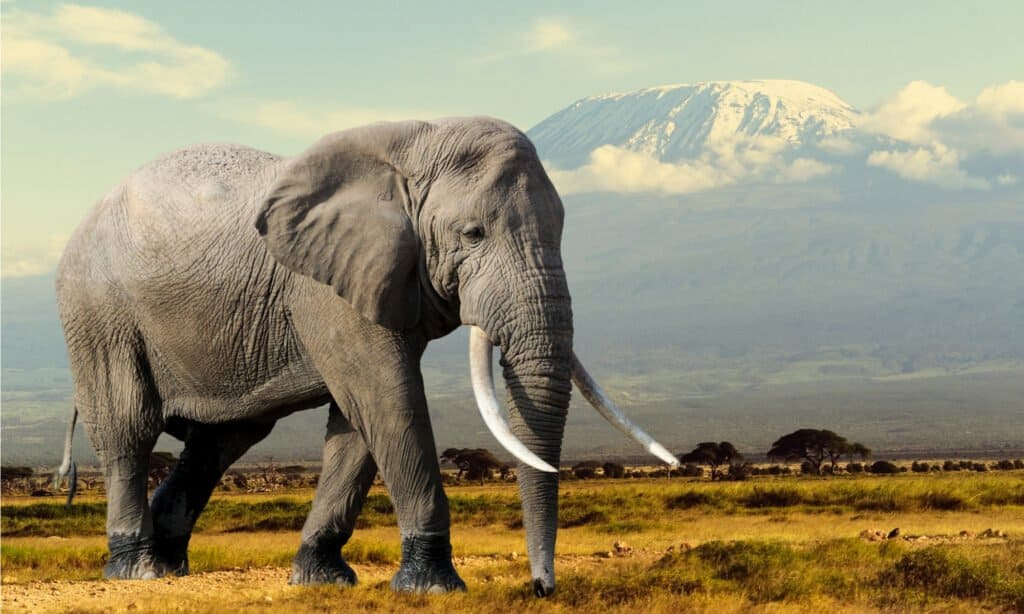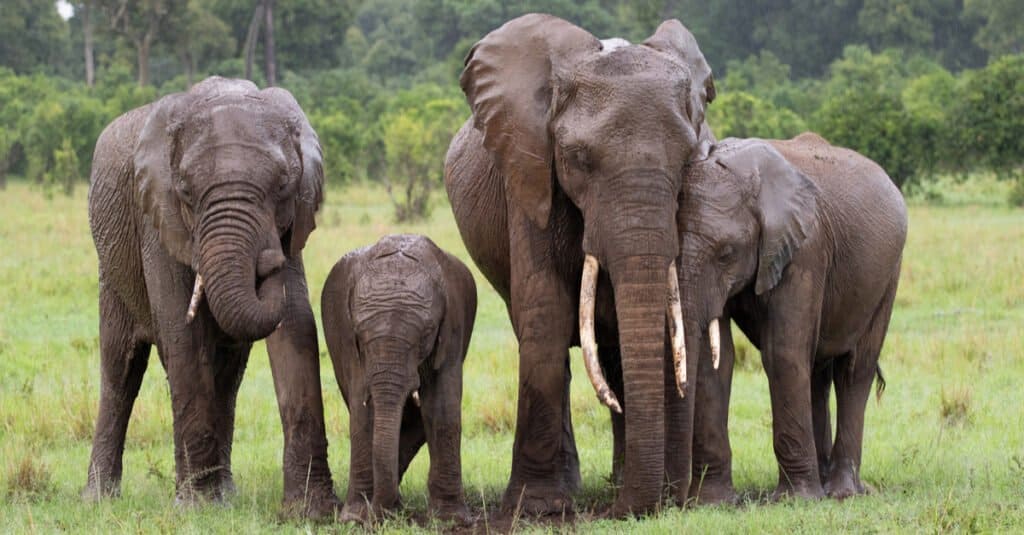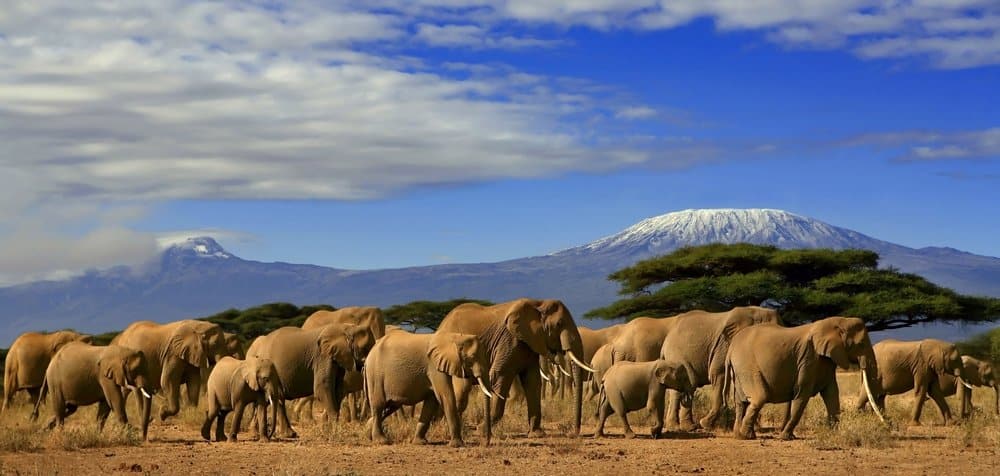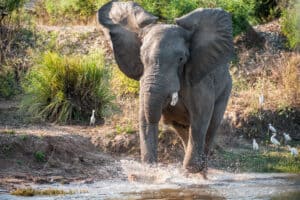An elephant never forgets — or does it? Elephants are intelligent mammals that recall faces and places, but how much can they actually remember? Let’s find out about elephant memory: how good is it really?
Elephant: Species Overview
Elephants are the largest land mammals on Earth. They have distinctive large ears, versatile trunks, large, powerful bodies, and, as we are about to find out, excellent memory skills.
Both male and female elephants grow tusks, which are extended teeth, to help lift objects, strip bark from trees, dig for water, and defend themselves against their very few predators. Poachers kill elephants for their incredible tusks, which are sold on the black market as ‘ivory.’
Elephants are native to Africa and Asia. There are two distinctive African elephant species, the savanna elephant (Loxodonta africana) and the forest elephant (Loxodonta cyclotis). Forest elephants are the smaller of the two. In Asia, there is just one species (Elephas maximus). Asian elephants have smaller ears than their African cousins.
These gentle herbivores roam extensively in search of water and enough plants for the herd to eat. They graze up to 18 hours a day and eat a vast amount of greenery, which causes conflict with farmers.
Due to their valuable ivory and competition for land, elephants are at risk of extinction. The IUCN Red List has assessed African savanna and Asian elephants as Endangered and the African forest elephant as Critically Endangered, just one step away from extinction in the wild.

Both male and female elephants grow tusks to help lift objects, strip bark from trees, dig for water, and for defense.
©Volodymyr Burdiak/Shutterstock.com
Elephant Memory – How Good Is It?
Elephants have excellent memories. In fact, researchers suggest their memory is just as good as that of dolphins and apes.
An elephant never forgets might be an exaggeration, but elephants actually have the largest brains of all land mammals. An adult elephant’s weighty brain reaches nearly 11 pounds, that’s 8 pounds heavier than a human’s brain!
Although brain size doesn’t necessarily indicate more brain power, elephants indeed have an incredible memory because their cerebral cortex is so big.
This is the brain area that stores long-term memories. Elephant brains are structured similarly to human brains, which means they are capable of a wide variety of intellectual abilities, including memory, grief, mimicry, art, playing, using tools, altruism, and self-awareness. They can recognize themselves in a mirror, a skill that very few animals possess.
African elephant researchers have discovered that the oldest matriarch elephants have the best memories. The older the elephant, the more time she’s had to experience life, meet others, and build up a memory bank of faces and places. Because matriarchs lead the herd, her memory is incredibly valuable to the group.

Elephants have excellent memories, believed to be just as good as that of dolphins and apes.
©Neil Tyers/Shutterstock.com
What Kinds of Things Do Elephants Remember?
Scientists believe elephants use their impressive long-term memory to remember faces (friends or enemies) and places to boost their chances of survival.
Places
Matriarch elephants use memories that are decades old. For example, during times of drought, an experienced matriarch will move the herd to better feeding grounds.
Researchers have witnessed elephants returning to grazing lands over 60 miles away after decades of absence. This article from the Proceedings of the Royal Society B explains how this study was accomplished and how it proves elephants have astonishing spatial memory.
Remembering information such as this is key to survival in the wild, but researchers don’t know exactly how elephants achieve it. Some suggest they have an advanced chemical or scent memory rather than the sight memory humans rely on.
Faces
Elephant herds are made of relatives, including grandparents, aunties, and sisters. Female elephants stay with the herd for their lifetime, but young males may leave. When they re-encounter their family herd, the reunion is friendly. Matriarch elephants signal to the rest of the herd, indicating whether the newcomer is friendly or not.
Herds make it easier for female elephants to protect their young, so recognizing friendly faces is another incredible survival strategy. Researchers in Africa have witnessed family reunions after decades of absence. The reunited elephants became animated and excited to see each other again, reaching out with their trunks and loudly bellowing.
Elephants can even recognize a deceased family member’s tusks and show signs of grief when they encounter the bodies or bones of their loved ones.
Colors and Shape
It’s not just friendly faces elephants remember. They also recall foes and injuries, and they bear grudges, too.
For example, when researchers wore clothing similar to tribal groups that threw spears at them (a coming-of-age ritual), the elephants would react warily and show negative signs of stress. This indicates an elephant can remember not just faces and tusks but also colors and shapes.

Scientists believe elephants use their long-term memory to remember faces (friends or enemies) and places to boost their chances of survival.
©Paul Hampton/Shutterstock.com
Why Do Elephants Have Good Memories?
Animals in difficult environments, such as drought-prone savannas, benefit from excellent long-term memories.
As we’ve seen, elephants have a large cerebral cortex capable of creating a large long-term memory for their, and the herd’s, survival.
Matriarchs build up memories to help the herd survive. For example, they can recall distant watering holes or family members after decades of separation. Time and distance do not seem to impact their memories, indicating excellent long-term retention. Because elephants can live for 60 years in the wild, this leads to an incredible build-up of working knowledge.
Extreme climates and hunter/predatory creatures are navigated or avoided with their powerful memories. Unfortunately for elephants, their spectacular long-term memory has made them vulnerable to human entertainment. Circuses and animal performance troupes favor elephants not only because their huge size is impressive but because they are easy to train. Elephants are able to remember tricks and routines with ease.
The matriarch’s memory bank is a font of survival knowledge for a herd, so this means that poaching is a huge threat to their survival as a species.
Poachers kill the largest elephants with the largest tusks. This is most often the oldest elephant and, therefore, the elephant with the most useful memories.
If the old, brainy matriarch is killed, younger herd members will not know where to go in extreme drought because they have never been there before. Even one elephant’s death negatively impacts a herd, and because they are endangered, this knowledge loss impacts the whole species.
Is an African Elephant’s Memory Better Than an Asian Elephant’s?
There’s no research indicating whether an African or an Asian elephant has a better memory. They are both intelligent species with the capacity for incredible long-term memory.
Which Animal Has the Best Memory?
The animal kingdom is full of creatures with excellent memories because having a good memory increases their chance of survival.
Some of the animals with the best memories are dolphins that can recognize absent friends after a 20-year gap, whales that repeatedly navigate entire ocean worlds, apes capable of memorizing number sequences, and corvid birds that can remember faces after a five-year gap.
Of course, there are many clever animals in the world, but being clever doesn’t always equate to good memory skills. Many animals live by their wits and their instincts, but elephants have excellent memories that store their life experiences.
Do elephants have a better memory than humans? Maybe! Could you navigate over 60 miles after a 20-year gap?

Another species with excellent memory skills is dolphins, known to recognize absent friends after a 20-year gap.
©Elena Larina/Shutterstock.com
How Good Is an Elephant’s Memory: Quick Recap
Elephants have excellent long-term memories. They have large brains with a big cerebral cortex that enables long-term memory storage. Elephants are long-lived animals, so they are able to build up an incredible knowledge bank over time.
Herd-leading matriarch elephants have the best memories. Drought-suffering matriarchs lead herds on long migrations to grazable land after many years of absence. Elephants can also remember family members after decades apart and even clothing worn by hunters that harmed them.
Next time someone says you have the memory of an elephant, take it as the compliment you deserve because elephants have one of the best memories in the animal kingdom.
The photo featured at the top of this post is © Ocean Eloy/Shutterstock.com
Thank you for reading! Have some feedback for us? Contact the AZ Animals editorial team.






